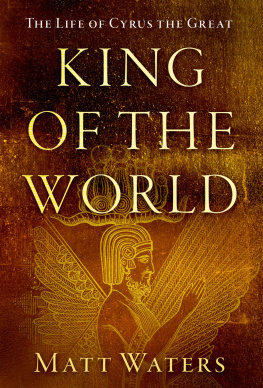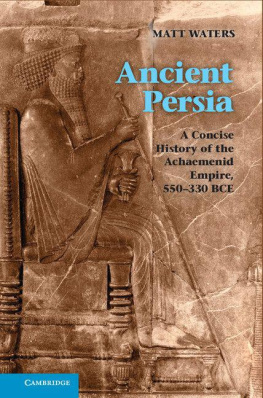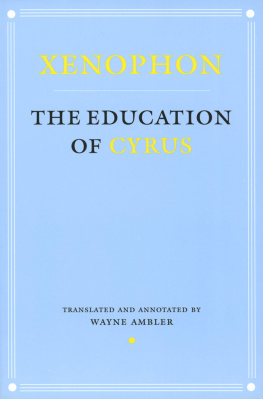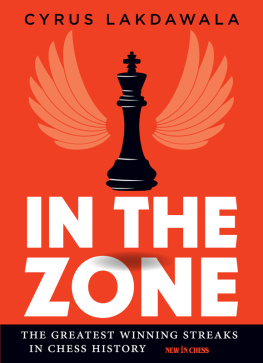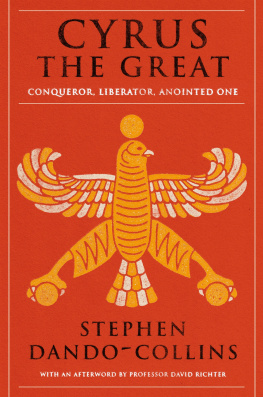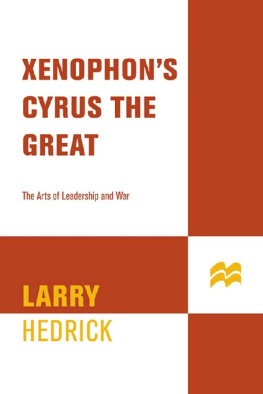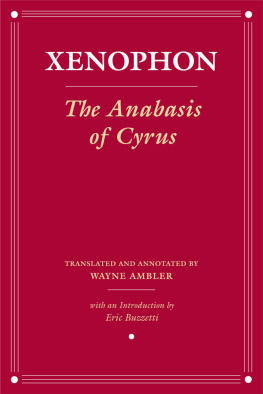Matt Waters - King of the World: The Life of Cyrus the Great
Here you can read online Matt Waters - King of the World: The Life of Cyrus the Great full text of the book (entire story) in english for free. Download pdf and epub, get meaning, cover and reviews about this ebook. year: 2022, publisher: Oxford University Press, genre: Religion. Description of the work, (preface) as well as reviews are available. Best literature library LitArk.com created for fans of good reading and offers a wide selection of genres:
Romance novel
Science fiction
Adventure
Detective
Science
History
Home and family
Prose
Art
Politics
Computer
Non-fiction
Religion
Business
Children
Humor
Choose a favorite category and find really read worthwhile books. Enjoy immersion in the world of imagination, feel the emotions of the characters or learn something new for yourself, make an fascinating discovery.
- Book:King of the World: The Life of Cyrus the Great
- Author:
- Publisher:Oxford University Press
- Genre:
- Year:2022
- Rating:3 / 5
- Favourites:Add to favourites
- Your mark:
- 60
- 1
- 2
- 3
- 4
- 5
King of the World: The Life of Cyrus the Great: summary, description and annotation
We offer to read an annotation, description, summary or preface (depends on what the author of the book "King of the World: The Life of Cyrus the Great" wrote himself). If you haven't found the necessary information about the book — write in the comments, we will try to find it.
Matt Waters: author's other books
Who wrote King of the World: The Life of Cyrus the Great? Find out the surname, the name of the author of the book and a list of all author's works by series.
King of the World: The Life of Cyrus the Great — read online for free the complete book (whole text) full work
Below is the text of the book, divided by pages. System saving the place of the last page read, allows you to conveniently read the book "King of the World: The Life of Cyrus the Great" online for free, without having to search again every time where you left off. Put a bookmark, and you can go to the page where you finished reading at any time.
Font size:
Interval:
Bookmark:


Oxford University Press is a department of the University of Oxford. It furthers the Universitys objective of excellence in research, scholarship, and education by publishing worldwide. Oxford is a registered trade mark of Oxford University Press in the UK and certain other countries.
Published in the United States of America by Oxford University Press
198 Madison Avenue, New York, NY 10016, United States of America.
Oxford University Press 2022
All rights reserved. No part of this publication may be reproduced, stored in a retrieval system, or transmitted, in any form or by any means, without the prior permission in writing of Oxford University Press, or as expressly permitted by law, by license, or under terms agreed with the appropriate reproduction rights organization. Inquiries concerning reproduction outside the scope of the above should be sent to the Rights Department, Oxford University Press, at the address above.
You must not circulate this work in any other form and you must impose this same condition on any acquirer.
Library of Congress Cataloging-in-Publication Data
Names: Waters, Matthew W. (Matthew William), author.
Title: King of the world : the life of Cyrus the Great / Matt Waters.
Other titles: Life of Cyrus the Great
Description: New York, NY : Oxford University Press, 2022. |
Includes bibliographical references and index.
Identifiers: LCCN 2021058974 (print) | LCCN 2021058975 (ebook) |
ISBN 9780190927172 (hb) | ISBN 9780190927196 (epub) | ISBN 9780197584316
Subjects: LCSH: Cyrus, the Great, King of Persia, -530 B.C. or 529 B.C. |
Achaemenid dynasty, 559 B.C.330 B.C. | IranKings and
rulersBiography. | IranHistoryTo 640.
Classification: LCC DS282 .W38 2022 (print) | LCC DS282 (ebook) |
DDC 935/.05092 [B]dc23/eng/20220121
LC record available at https://lccn.loc.gov/2021058974
LC ebook record available at https://lccn.loc.gov/2021058975
DOI: 10.1093/oso/9780190927172.001.0001
Cyrus the Great, the founder of the Achaemenid Persian Empire, reigned from 559 to 530 bce. He was a transformational figure in world history, and many things to many people. To the early Persians and Elamites, Cyrus was an exceptional leader who launched them onto a world stage stretching from Central Asia to Anatolia and beyond, a visionary responsible for a dramatic rise in their fortunes, both figuratively and literally. To the ancient Babylonians, he was cast as a king in the frame of Hammurabi; although of foreign origin, he was represented as fully vested in their traditions. To the ancient Judeans, he was a foundational figure responsible for their freedom from Babylonian domination, literally termed a messiah figure, who facilitated the rebuilding of the Temple of Solomon and inaugurated what today is called the Second Temple period. To ancient Greek and Roman writers, Cyrus was a model ruler, in whom were crystallized the highest qualities of leadership and ingenuity, but who could also be a relentless and ruthless general. In modern times the same superlatives are also applied to Cyrus, who remains for many a nationalistic symbol that encapsulates the glory of the earliest periods of Iranian history.
What made him so great? Beyond the epithet Great King, of course, which was a title claimed by a host of kings in antiquity, but one that did not often stick after their reigns. For that matter, the epithet great has been applied to a number of people throughout history, often (but certainly not always) assigned after their lifetimes: a function of being remarkable in their physical characteristics or outstanding in their abilities or accomplishments. These all applied to Cyrus, the particulars of which will be explored throughout this book. Cyrus the individual remains elusive, however, as he left no surviving testimony beyond a handful of royal inscriptions. We must sift several, often disjointed, ancient perspectives to get a sense of the man. Nonetheless, Cyrus was an object of fascination even in antiquity, among several peoples, and it is remarkable that he attained, and maintained, such positive press in almost all sources, across cultures and across centuries. Cyrus thus remains a worthy object of attention for the imprint he left on world history, anywhere the ancient Achaemenid Empire touched in antiquity, and its extensive but sometimes subtle legacy thereafter. Unless noted otherwise, references to Cyrus are to be understood throughout this book as referring to Cyrus II, in other words, Cyrus the Great. There were other Cyruses, notably Cyrus the Greats grandfather, who when discussed will be referred to as Cyrus I. Another prominent Cyrus dates from the late fourth century, Cyrus the Greats great-great-great-grandson, called Cyrus the Younger in modern literature. The name Cyrus is, of course, anglicized from the Latin spelling of the name; in Greek it was Kuros, in Hebrew Koresh, in Elamite and Babylonian Kurash, and in Old Persian Kurush.
The title of this book is taken from one of the royal epithets from Cyrus few extant inscriptions, dedicated shortly after his conquest of what had been the Babylonian Empire in 539 bce. The Babylonian title ar kiati, the King of the World, as it applied to Cyrus both implied and indicated just that. (The is pronounced sh in English.) The word kiati meant totality, encompassing everything, and indeed some modern translations prefer the translation universe to relay that sense. The translation world seems sufficient here to demarcate Cyrus rule over the realm of humans as distinct from that of the gods. The title ar kiati was not new, but when Cyrus became King of the World, it was closer to a literal reality than for any ruler before him in history.
But even then Cyrus did not rule Egypt, for centuries part of the same world, the ancient Near East, the region referred to as ). This, the Achaemenid Persian Empire, was eclipsed only briefly by Alexander the Great upon his conquest of it, and only matched again by the height of the Roman Empire a few centuries later.
For a figure of such historical import, the record on Cyrus is unfortunately thin. This in turn is no doubt part of the reason Cyrus has not received as much airtime in modern times, especially when considered with other famous conquerors who followed in his footsteps, such as Alexander the Great, Julius Caesar, or Chinggis Khan. Cyrus may be matched with any of these, though books dedicated to him are far fewer in number than for any of the preceding. Several academic conferences and museum exhibitions have raised the profile of Cyrus and the Achaemenids in recent years. For Cyrus himself, the importance of the inscription called the Cyrus Cylinder continues to reiterate his historical importance during the last generation. The loan of the artifact, usually housed in the British Museum, to the National Museum of Iran in 2010 and, subsequently, a museum tour of the United States in 2013 served as the impetus for several publications and an international conference commemorating Cyrus himself. Important tributes and articles relevant to these events have been published in .
History is context and interpretation, and that certainly applies to historical reconstruction from a thin, and at times contradictory, record. This treatment of Cyrus is written for the general reader; it examines Cyrus life from birth to emperor as it may be tracked from a variety of documentary, archaeological, and art historical evidence. I have endeavored to present a balanced view of what we know, what we do not know, and (at least as of the present writing) what we cannot know: to acknowledge uncertainties or instances where there are multiple interpretations of the varied evidence. Primary source references and allusions to the wide-ranging scholarly literaturediscussing the particulars of numerous contested interpretations and the related caveatsare for the most part relegated to endnotes and the bibliography, wherein the interested reader may find references to a variety of Cyrus-related topics. For the reader new to this material, I recommend first consultation of the brief timeline and chronological table, and especially Appendix A on the ancient source material and its difficulties, to get some initial orientation into the diverse and complex world that was the ancient Near East in the mid-first millennium bce.
Font size:
Interval:
Bookmark:
Similar books «King of the World: The Life of Cyrus the Great»
Look at similar books to King of the World: The Life of Cyrus the Great. We have selected literature similar in name and meaning in the hope of providing readers with more options to find new, interesting, not yet read works.
Discussion, reviews of the book King of the World: The Life of Cyrus the Great and just readers' own opinions. Leave your comments, write what you think about the work, its meaning or the main characters. Specify what exactly you liked and what you didn't like, and why you think so.

